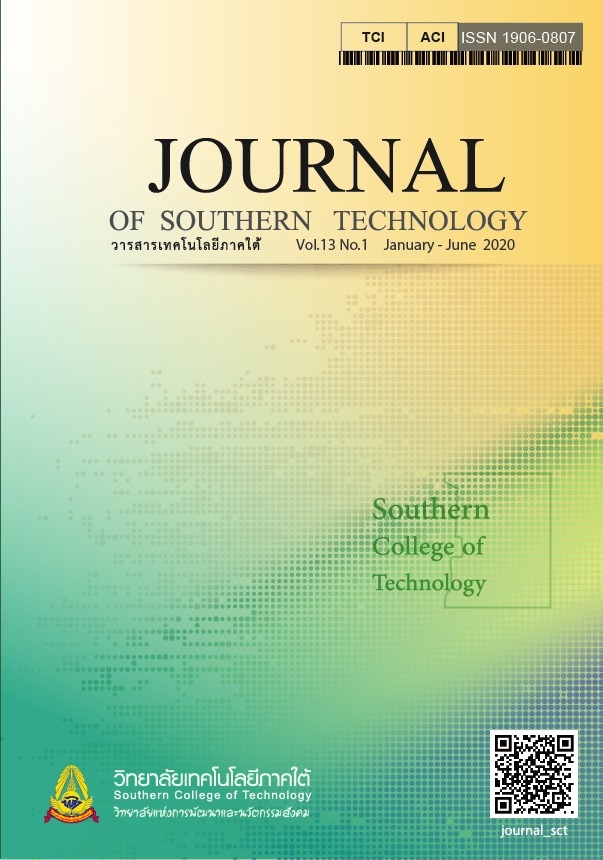Audit Proficiency and Audit Report Quality of Tax Auditors (TAs) in Thailand
Main Article Content
Abstract
This research aimed to examine the relationship between audit proficiency (i.e. intelligent audit planning strategy, excellent functional risk analysis, integrated audit performance, audit evidence gathering, and superior client relationship management.) and audit report quality of tax auditors (TAs) In Thailand. This study employed a questionnaire for data collection. The study population consisted of 3,422 tax auditors (TAs) in Thailand. A simple random sampling was used to select 1,790 respondents and 383 of them (21%) returned their responses. The statistical data analysis included mean, standard deviation, and multiple regression analysis. The study results illustrated that 1) there were positive relationship and effect of intelligent audit planning strategy on the quality of audit report (β1 = 0.099, P<.10), 2) there were positive relationship and effect of excellent functional risk analysis on the quality of audit report (β2= 0.678, P<.01), and 3) there were also positive relationship and effect of superior client relationship management on the quality of audit report (β3= 0.213, P<.05). Nonetheless, there was no significant relationship among integrated audit performance, audit evidence gathering, and the quality of audit report.
Article Details
-
Authors must agree to the journal publication rules and allow the editors to edit the manuscripts for publication.
-
Author’s right belongs to the author but Journal of Southern Technology holds the right of first publication and thus allow readers to use the article for the purpose of education but not commercial.
References
Aaker, D. A., Kumar, V., & Day, G.S. (2001). Marketing Research. New York: John Wiley & Sons.
Barney, J.B. (1991). Firm resources and sustained competitive advantage. Journal of Management, 17, 99-120.
Black, K. (2006). Business Statistic for Contemporary Decision Making (4th ed.). USA: John Wiley & Sons.
Blay, A., Sneathen, L., Jr., & Kizirian, T. (2007). The Effects of fraud and going concern risk on auditors’ assessments of the risk of material misstatement and resulting audit procedures. International Journal of Auditing, 11(3), 149-163.
Chanruang, S., & Ussahawanitchakit, P. (2011). Audit sustainability of CPAs in Thailand: Effects of audit planning competency and audit report quality. International Journal of Business Research, 11(6), 57-82.
Chotikunnusorn, A. (2013). Management of customer relationship management technology to excellence service. Journal of Vocational and Technical Education, 3(6), 43-50. [in Thai]
Digital Economy Promotion Agency. (2017). SMEs 4.0 stick to trade wings with Digital Marketing. Retrieved March 11, 2018, form https://www.sipa.or.th/th/article/smes-40-ติดปีกการค้าด้วย-digital marketing. [in Thai]
Grant, R.M. (1996). Toward a Knowledge-Based Theory of the Firm. Strategic Management Journal, 17, 109 –122.
Henchokchaichana, N., & Srichanpetch, S. (2014). Auditing and Assurance Services. Bangkok: T.P.N. Press [in Thai]
Herkema, S. (2003). A Complex adaptive perspective on learning within innovation projects. The Learning Organization, 10(6), 340- 346.
Langkhunsaen, S., Ussahawanitchakit, P., & Boonlua, S. (2014). Audit review proficiency and audit goal achievement. Journal of International Finance and Economics, 14(3), 65-85.
Lemon, M., & Sahota, P. S. (2003). Organizational culture as a knowledge repository for increased innovation capacity. Technovation, 24(6), 483-498.
Messier, W.F.Jr., Glover, S.M., & Prawitt, D.F.(2016). Auditing and Assurance Services: A Systematic Approach (10th ed.). McGraw-Hill Education.
Nickerson, J. A., & Zenger, T. R. (2004). A Knowledge-based theory of the firm-the problem-solving perspective. Organization Science, 15(6), 617- 632.
Nunnally, J.C. (1978). Psychometric Theory (4th ed.). New York: McGraw Hill.
Nunnally, J. C., & Bernstein, I. H. (1994). Psychometric Theory (4th ed.). New York: McGraw Hill.
Pongsatitpat, S., & Ussahawanitchakit, P. (2012). Audit review practice, audit report efficiency, audit performance, and audit quality of certified public accountants (CPAs) in Thailand. Review of Business Research, 12(4), 1-15.
Rachbunoi, S. (2012). Effects of Audit Process Standards on Audit Report Quality of Cooperatives Auditors in Thailand (Master's Thesis). Mahasarakham University. [in Thai]
Rukprasoot, S., & Ussahawanitchakit, P. (2013). Audit governance and sustainable audit success: An empirical investigation of certified public accountants (CPAs) in Thailand. International. Journal of Business Research, 13(3), 5-28.
Sinchuen, C., & Ussahawanitchakit, P. (2009). Effects of strategic audit planning on audit performance: Mediator role of audit judgment and quality and public auditors in Thailand. Journal of Academy of Business and Economics, 9(2), 1-15.
Sisaart, B. (2010). Introduction to Research. Bangkok: Suviriyasan. [in Thai]
Smith, D. (2006). Exploring Innovation. Maidenhead, Berkshire: McGraw-Hill.
The Revenue Department. (2018). List of Certified Auditors. Retrieved May 3, 2018, form https://taxaudit.rd.go.th/ta2/TaxAuditor_Inf.jsp [in Thai]
Thitiyapramote, N. (2018). Managerial Accounting innovation and firm success of ISO 9001 businesses in Thailand. Journal of Southern Technology, 11(2), 161-170.
Yamane, T. (1973). Statistics: An Introductory Analysis (3rd ed.). New York: Harper and Row Publication.

